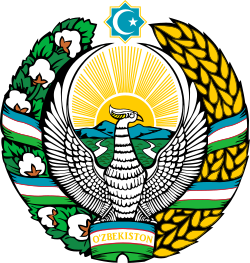RESEARCH COLLABORATION WITH GOVERNMENT AND NON-GOVERNMENT ORGANIZATIONS
TSUULL research centres conduct independent policy-relevant research, organize bespoke professional development and run specialist events such as conferences, workshops and seminars. We bring together experts, government officials and NGOs, scholars from the fields of education, business, information technologies, law and political science to create and communicate high-quality research.
The centres have close links with (but is independent of) a wide range of regulatory authorities, government bodies and NGOs. These include the Cabinet of Ministers of Uzbekistan, Erasmus+ office in Uzbekistan, the State Testing Center, The Ministry of Higher and Secondary Specialized Education of the Republic of Uzbekistan, the Ministry of innovative development of the Republic of Uzbekistan, American Council, British Council, Terram Pacis, Advanced Training Centre
|
|
|
|
|
|
|
Our collaboration with non-government organizations: Association Central Asia, Alterrative, PolitIQ the Center for Crisis Society Studies, Central Asia Barometer
|
|
|
|
|
For more information about our NGO collaboration, click here
https://tsuull.uz/en/content/achieving-sdg-tsuull-monitoring-sustainable-development-developing-countries-guest-lecture
https://tsuull.uz/en/content/guest-lecture-environmental-sustainability-italian-ngo-tsuull-20-january
https://tsuull.uz/en/content/constitution-guarantee-bright-future-uzbek-people
https://tsuull.uz/en/content/tsuull-talks-program-expert-communications-holds-guest-lecture-tsuull-students-12-may
Alisher Navo’i Tashkent State University of Uzbek Language and Literature has research centers under 11 departments.
These are:
|
№ |
Name of the research center |
Director of the Research Center |
|
1. |
Research Center at the Department of Theory and Practice of Translation |
PhD, Kholikov Bahodir Alikulovich |
|
2. |
Research Center at the Department of Intercultural Communication and Tourism |
Doctor of Philological Sciences, Associate Professor Normurodova Nozliya Zarilovna |
|
3. |
Research Center at the Department of Practical Linguistics and Linguodidacticsa |
Doctor of Philological Sciences, Professor Mengliyev Baxtiyor Rajabovich |
|
4. |
Research Center at the Department of Literature Teaching Methods |
Doctor of Philological Sciences, Associate Professor Abdullayeva Marg‘uba Do‘stmiratovna |
|
5. |
Research Center at the Department of Uzbek Language |
Doctor of Philological Sciences, Professor Muhamedova Saodat Xudoyberdiyevna |
|
6. |
Research Center at the Department of Information Technology |
PhD, Elov Botir Boltaevich |
|
7. |
Research Center at the Department of Language Theory |
Doctor of Philological Sciences, Professor Xolmonova Zulxumor Turdiyevna |
|
8. |
Research Center at the Department of Literary Theory |
Doctor of Philological Sciences, Professor Karimov Bahodir Nurmetovich |
|
9. |
Research Center at the Department of Uzbek Linguistics |
Doctor of Philological Sciences, Associate Professor Tog‘ayev To‘lqin Mamanazarovich |
|
10. |
Research Center at the Department of History of Uzbek Literature and Folklore |
Doctor of Philological Sciences, Professor Jabborov Nurboy Abdulhakimovich |
|
11. |
Research Center at the Department of Textual Studies and Literary Source Studies |
Doctor of Philological Sciences Zohidov Rashid Fozilovich |
The main purpose of the centers is the creating scientific and innovative production, the provision of various services and consultations, the organization and implementation of seminars and trainings for universities and businesses entities in the country .The main task of the centers is to increase the scientific potential of the department and accelerate scientific and innovative activities, contribute to the development of economic sectors in the country through research projects and economic contracts, and ensure cooperation with them.
The centers are planned to conduct economic accounting independently and increase the financial interest of teachers of the department. The departments will manage the funds transferred to the account of the research center through economic contracts with enterprises and organizations, which will serve as an additional resource for improving the material and technical base of the department, giving motivation for teachers.
It is remarkable that contracts with network organizations can allow students to organize internships, to develop their professionals, and to become potential employees of the internship organization.
The centers can also be funded by the Ministry of Innovation Development of the Republic of Uzbekistan through fundamental, practical and innovative thematic grants as well as grants from international organizations.
We consider these aspects as important:
1. Identifying problems and challenges: By actively participating in policy development, individuals and organizations can contribute their insights and expertise to identify the pressing problems and challenges related to sustainable development. This ensures that policies are grounded in a thorough understanding of the issues at hand.
2. Developing policies and strategies: Involvement in policy development allows stakeholders to contribute to the formulation of effective policies and strategies. Their input helps ensure that policies are comprehensive, inclusive, and consider different perspectives and needs. This collaborative effort can result in more impactful and sustainable solutions.
3. Modelling likely futures: Stakeholder involvement enables the exploration and modeling of different scenarios, both with and without interventions. By using tools such as scenario planning, stakeholders can assess the potential impacts of different policy options and make informed decisions. This helps policymakers understand the potential consequences of their actions and make evidence-based choices.
4. Monitoring and reporting on interventions: Active involvement in policy development allows stakeholders to participate in monitoring and reporting on the progress of interventions. By providing input on data collection, indicators, and reporting mechanisms, stakeholders can ensure that interventions are effectively monitored and evaluated. This facilitates transparency and accountability in the implementation of SDG policies.
5. Enabling adaptive management: Involvement in policy development empowers stakeholders to engage in adaptive management. As challenges and circumstances evolve, policies may need to be adjusted or revised. Stakeholder input enables policymakers to respond dynamically to changing contexts, making policy responses more agile and effective.
You may be interested in these: https://sdg5.tsuull.uz/collaboration.html
SDGs Implementation in TSUULL Conference
University startegic conception report














